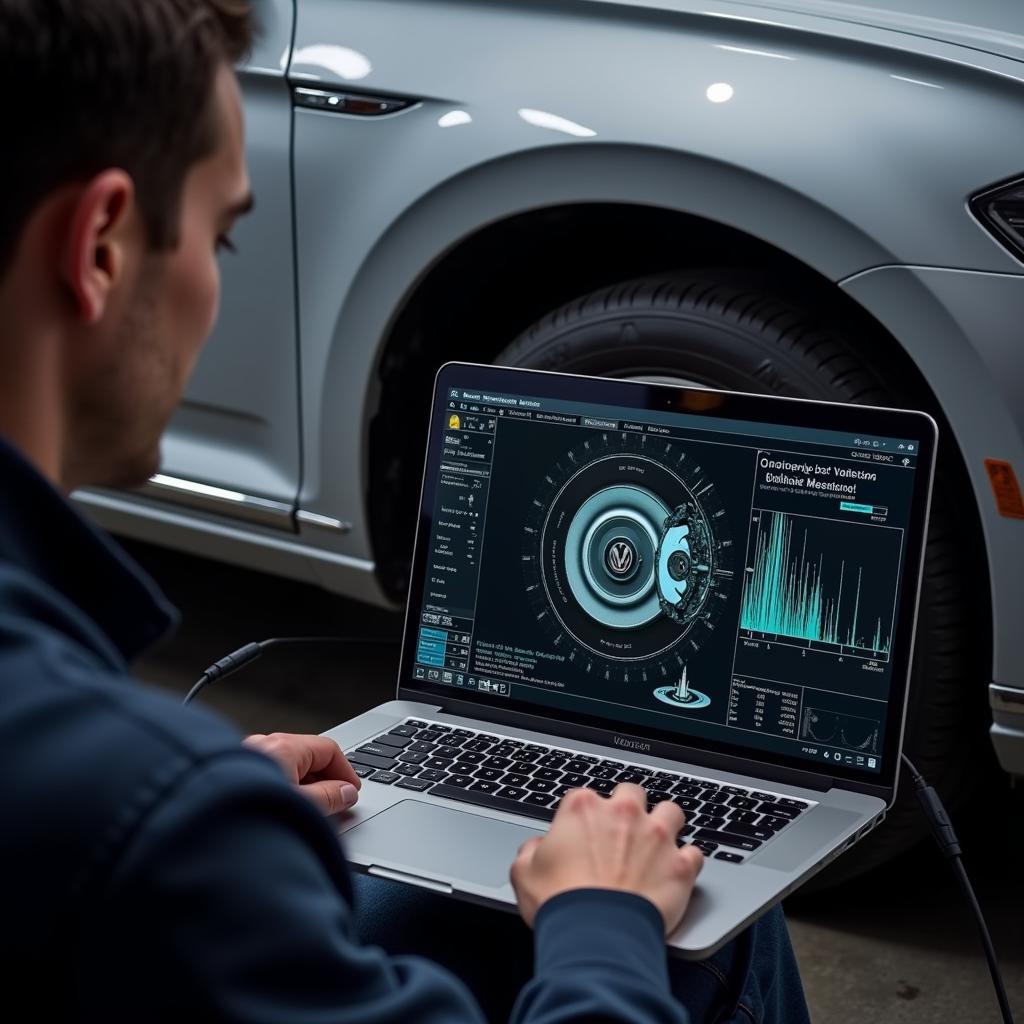The dreaded brake warning light on your Volkswagen Passat dashboard can cause quite a bit of anxiety. It’s a signal that something isn’t right with your braking system and needs attention. But don’t panic! This article will guide you through the common causes of the Passat brake warning indicator illuminating and provide solutions to get you back on the road safely.
Understanding Your Passat’s Brake Warning System
The brake warning light is part of a complex system that monitors several components crucial to your Passat’s ability to stop safely and effectively. It’s designed to alert you to potential problems before they become serious safety hazards.
Common Causes of a Passat Brake Warning Light
There are several reasons why your Passat’s brake warning indicator might turn on. Here are some of the most frequent culprits:
- Worn Brake Pads: This is the most common reason for the warning light. Most Passats have sensors in the brake pads that trigger the light when they wear down to a certain level.
- Low Brake Fluid: Your Passat’s braking system relies on hydraulic pressure created by brake fluid to function. A leak in the system or low fluid level can trigger the warning light.
- Faulty Brake Light Switch: The brake light switch activates your brake lights when you press the pedal. If it malfunctions, it can also cause the brake warning light to illuminate.
- ABS Issues: Your Passat’s Anti-lock Braking System (ABS) is a safety feature that helps prevent wheels from locking up during hard braking. A problem with the ABS system, such as a faulty sensor, can also trigger the warning light.
- Parking Brake Engaged: While seemingly obvious, it’s easy to overlook. If your parking brake isn’t fully released, it can trigger the warning light.
Diagnosing the Problem
To determine the exact cause of your Passat’s brake warning indicator, you’ll need to do some investigating.
- Check Your Parking Brake: Ensure the parking brake is fully disengaged.
- Inspect Brake Fluid Level: Carefully open the brake fluid reservoir (refer to your owner’s manual for location) and check the fluid level. It should be between the minimum and maximum markings.
- Visually Inspect Your Brakes: Look for signs of wear and tear on your brake pads and rotors. Look for any fluid leaks around the brake calipers and hoses.
What to Do When the Brake Warning Light Comes On
It’s crucial to remember that driving with an illuminated brake warning light is incredibly risky. If the light comes on:
- Pull over safely and assess: If possible, move your Passat off the road and away from traffic.
- Check for obvious issues: See if the parking brake is engaged or if there is a noticeable fluid leak.
- Consult your owner’s manual: It will have specific information about your model year and may provide additional troubleshooting steps.
Seeking Professional Help
If you’re unable to identify the cause of the brake warning light or are uncomfortable tackling repairs yourself, seek help from a qualified mechanic specializing in Volkswagen vehicles. They can accurately diagnose the issue and perform the necessary repairs.
2002 vw passat brake warning light
Remote Diagnostics and Software Solutions
In today’s technologically advanced world, remote diagnostics and software solutions are becoming increasingly available for automotive repair. Some companies specializing in Volkswagen vehicles, like Cardiag Tech, offer remote diagnostics and programming services to identify and resolve issues with your Passat’s brake system. These services can be a convenient and efficient option if:
- You’re experiencing intermittent brake warning lights.
- You suspect a software or module-related problem.
- You want to explore remote diagnostic options before visiting a mechanic.
vw passat brake pad warning light reset
“Remote diagnostics allow us to access the car’s computer system remotely, retrieve fault codes, and analyze data to pinpoint issues with the brake system,” says John Smith, a senior technician at a leading Volkswagen repair shop. “This helps us provide faster and more accurate solutions to our customers.”
 Remote Diagnostics on Volkswagen Passat
Remote Diagnostics on Volkswagen Passat
Preventing Future Issues
Maintaining your Passat’s braking system is key to preventing future problems and ensuring your safety on the road:
- Regular Brake Inspections: Adhere to your Passat’s recommended maintenance schedule for brake inspections and fluid flushes.
- Quality Parts: When replacing brake pads, rotors, or other components, always use high-quality parts designed for your specific Passat model.
- Address Issues Promptly: Never ignore the brake warning light or any signs of brake problems.
Conclusion
Addressing a Passat brake warning indicator is crucial for your safety and the longevity of your vehicle. While some causes might be straightforward to diagnose and fix, others require the expertise of trained professionals. By understanding your Passat’s brake warning system and taking the necessary steps for diagnosis and repair, you can keep your Volkswagen running smoothly and safely for miles to come.
FAQs
Can I drive my Passat with the brake warning light on?
It’s highly discouraged to drive with the brake warning light illuminated. It indicates a potential problem with your braking system, putting you and others at risk.
How often should I check my Passat’s brake fluid level?
It’s good practice to check your brake fluid level at least once a month and more frequently if you notice any changes in your brake pedal feel.
How long can I drive on worn brake pads?
It’s unsafe to drive on worn brake pads. As soon as you notice signs of wear or the warning light illuminates, have your brake pads inspected and replaced if necessary.
Can I reset the brake warning light myself?
While it’s possible to reset the brake warning light yourself, it’s crucial to address the underlying problem first.
Are aftermarket brake pads safe for my Passat?
While some aftermarket brake pads are reputable, it’s generally recommended to use original equipment manufacturer (OEM) parts or high-quality aftermarket options specifically designed for your Passat model.
